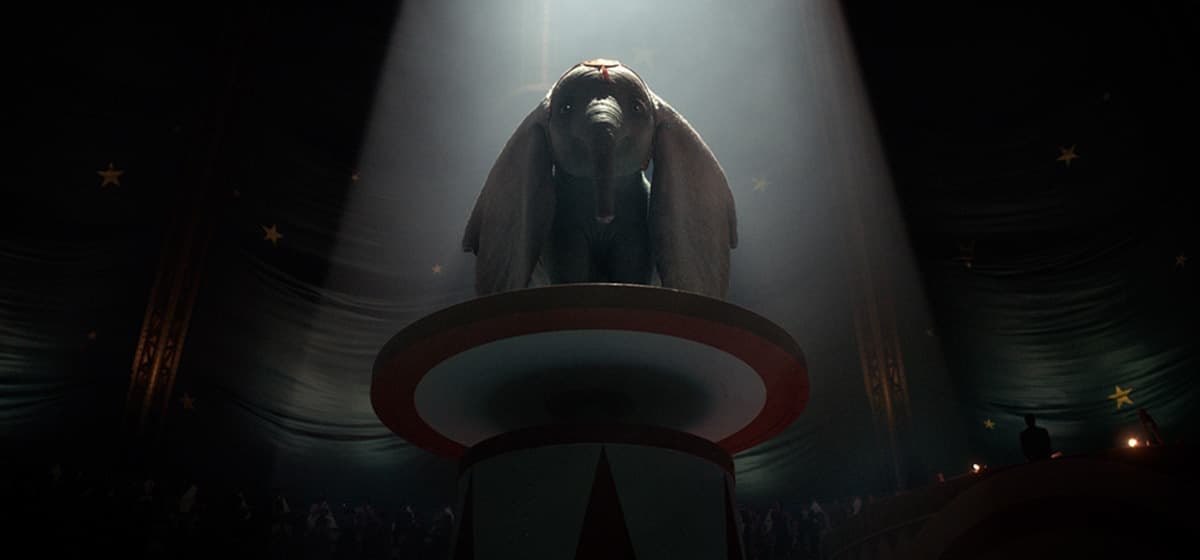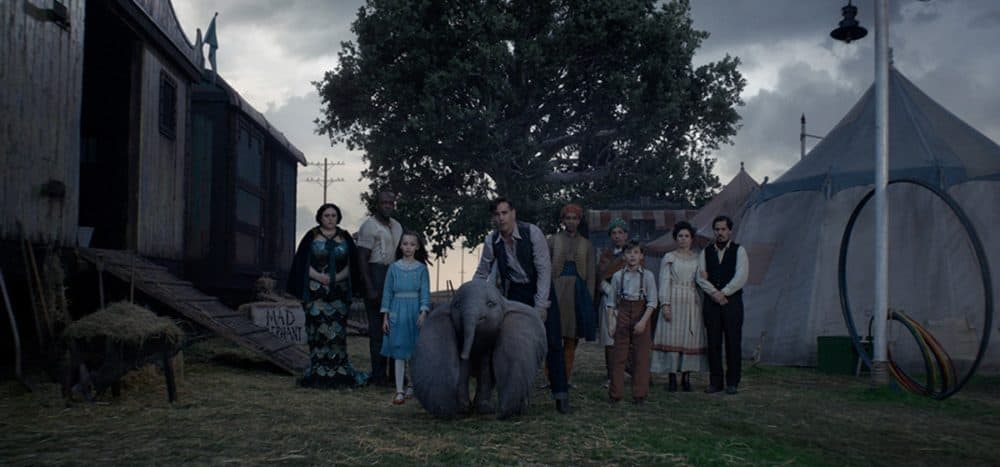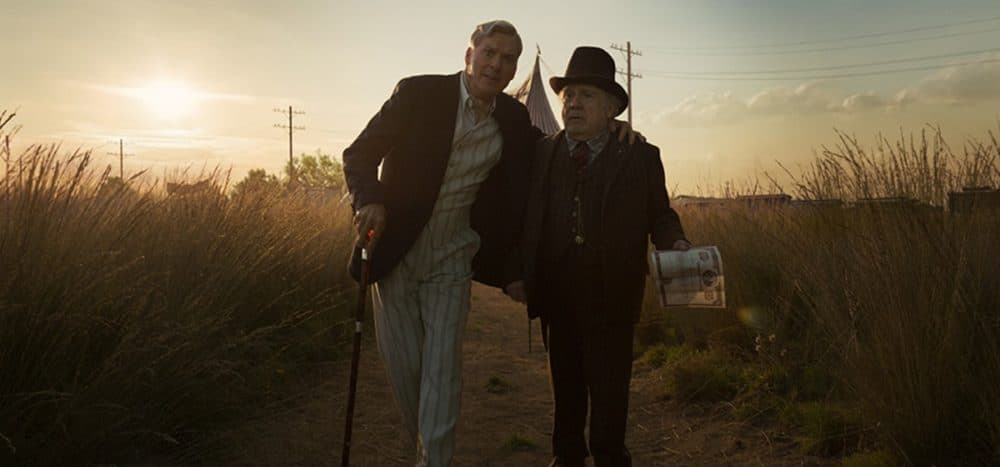Advertisement
Review
Overly Busy And Mechanically Manufactured, Tim Burton-Directed ‘Dumbo’ Doesn’t Fly

A curiously self-loathing exercise in corporate brand extension, Disney’s live-action remake of their 1941 animated classic “Dumbo” is the latest of the studio’s vault-plundering blockbuster rehashes. Everything old is new again in the risk averse, too-big-to-fail world of modern mega-budget filmmaking, so the giant-eared baby elephant took a bow over this past weekend, with similarly star-studded, CGI-assisted recyclings of “Aladdin” and “The Lion King” set to follow suit this summer.
Onetime wunderkind Tim Burton is at the helm of this new “Dumbo,” and perhaps he’s partially to blame for the Mouse House’s recent regurgitation kick — as the director’s garish 2010 take on “Alice in Wonderland” somehow managed to gross over a billion dollars at the box office despite being one of the most listless and visually revolting movies I have ever seen.
As a young man, Burton brought a kinky subversion to blockbuster filmmaking, with bursts of weirdo outsider empathy illuminating the likes of “Batman Returns,” “Edward Scissorhands” and “Ed Wood.” But by the time of “Charlie and the Chocolate Factory” or the abysmal “Alice,” Tim Burton movies had devolved into pre-sold properties featuring Johnny Depp wearing a funny hat. I rarely walk out of films but hit the bricks 40 minutes into his last picture — the 2016 YA adaptation “Miss Peregrine’s Home for Peculiar Children” — because it felt like being locked in a Hot Topic after the mall had closed.

“Dumbo” has a few frustratingly brief flashes of that old Burton magic, buried beneath an overly busy screenplay and mechanically manufactured conflicts. Set in 1919, the film follows a ramshackle circus run by irresistible huckster Max Medici — played by Danny DeVito in the film’s warmest, most endearing performance. Former star rodeo rider Holt Farrier (Colin Farrell doing one of his wobbly Southern accents) has just returned from WWI missing an arm, but it hardly matters that he can’t perform rope tricks anymore because Max had to sell all the horses anyway.
Holt’s wife passed away during the influenza epidemic, leaving their two young kids (Nico Parker and Finley Hobbins) tending to the elephants, and that’s how eventually we get around to Mrs. Jumbo’s big-eared baby, with plenty more plot complications to come. The new film is almost twice as long as the animated original — itself a spendthrift affair designed to cover the extravagant financial losses of “Pinocchio” and “Fantasia,” finished by scabs during an animators’ strike. The charms of the 1941 “Dumbo” are in its slightness — the movie’s like three songs, some racist crows, then the elephant flies and you’re outta there.
In Burton’s film, the elephant flies early on, and thankfully there are no crows. It’s almost too easy to spot the moments that captured the director’s imagination, as his affection for the oddballs in Max’s circus far outshines the pro forma trials of Farrier’s milquetoast family. (My favorite is Deobia Oparei as the strongman who doubles as the organization’s accountant.) No actor as gifted as Colin Farrell should be stuck playing the Zeppo Marx role, and throughout “Dumbo” I couldn’t help thinking about how much I would have enjoyed more time instead with DeVito’s troupe of carnies and misfits.
When you stop and think about it, there are so many ways in which Dumbo the elephant can be construed as a classic Tim Burton hero — the freak whose strange qualities make him both an outcast and hero — it’s a real bummer that the movie barely bothers to explore any of them. Instead Michael Keaton shows up as a cardboard villain in a comically awful toupée, amusing himself to no end with a zany, erratic performance that works maybe half the time. (Burton appears to have directed Keaton with the same discipline he imposed upon Jack Nicholson in “Batman” and “Mars Attacks!” — which is to say, none.)

Keaton’s playing the fictional impresario V.A. Vandevere, proprietor of the Coney Island theme park Dreamland, an actual place that famously burned to the ground in 1911 and sent circus animals scurrying into the New York City streets. (I suppose we could complain about screenwriter Ehren Kruger futzing with the real-life details but since this is a movie about a flying elephant, I’m inclined to give him a pass.) Vandevere purchases Max Medici’s circus in order to acquire their star attraction and then immediately fires the entire staff. For no good reason, he also recklessly endangers the lives of both Dumbo and a trapeze artist (Eva Green) by removing the nets before their big show and then later sends a henchman to go kill Dumbo’s mother.
None of this unpleasantness feels necessary nor even particularly appropriate for a gentle children’s story, and it’s supplemented by a weirdly obtrusive subtext about large corporate entertainment entities gobbling up and spitting out their smaller competitors. “Dumbo” is an awfully strange movie for the studio to release in the wake of Disney’s recent acquisition of 20th Century Fox, delivering something like 40 percent of the worldwide box office to its shareholders while costing hundreds of people their livelihoods.
It’s notable that one of the Mouse House’s first orders of business was shuttering the Fox 2000 division, through which the studio had produced diverse, modestly budgeted dramas like “Hidden Figures,” “The Fault in Our Stars” and “The Hate U Give,” scuttling the staff to the winds like members of Max Medici’s circus.
So is “Dumbo” supposed to be Burton’s cautionary tale about throwing one’s lot in with such sinister corporations? Could this be a grandly subversive message sent from inside the machine? A Disney blockbuster ending with celebratory shots of a theme park in flames would seem to be a statement of some sort, and if Tim Burton was still the filmmaker he was back in the 1990s I bet he probably could have pulled it off.
